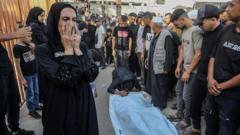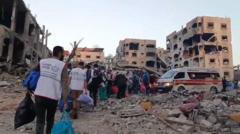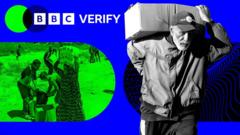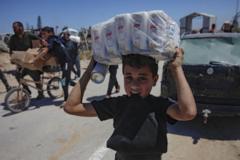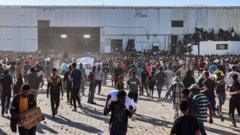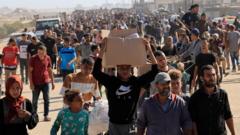The situation highlights the severe humanitarian crisis in Yemen, where millions depend on aid amid ongoing conflicts and political tensions.
**Yemen's Humanitarian Crisis Deepens as Aid Workers Face Arrest and Intimidation**
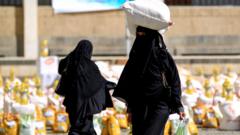
**Yemen's Humanitarian Crisis Deepens as Aid Workers Face Arrest and Intimidation**
Humanitarian aid workers in Yemen are grappling with increased dangers as arrests and office raids by the Houthi rebels spark fear and lead to operational cutbacks.
In recent months, Yemen has seen a troubling surge in raids and arrests targeting humanitarian workers. When Hanaa, an employee of a U.S.-funded NGO dedicated to women's empowerment, arrived at her office, she was met with a scene of chaos: "drawers and doors smashed, and the boss surrounded by security personnel." Equipment was seized, her supervisor was arrested, and the organization’s bank account was frozen.
Over a decade of civil war has turned Yemen into one of the world's gravest humanitarian crises, with nearly half the population—approximately 10 million children among them—needing urgent assistance. The recent crackdown has exacerbated the already precarious situation for those supporting humanitarian efforts. The detention of 24 UN employees and other NGO workers by Houthi rebels has incited a heightened atmosphere of fear.
With operations being curtailed, organizations including the UN are struggling to assist the already vulnerable communities. According to UN data, around 4.5 million people have been driven from their homes, with many residing in camps under dire conditions. The Houthis have been known to target NGOs that operate under foreign funding, raising fears among workers like Hanaa regarding their personal safety and potential accusations of espionage.
Hanaa recounted the psychological toll of these events, recalling how she could not eat or sleep for days after her workplace was raided. Recent political shifts, including former President Trump's designation of the Houthis as a terrorist organization, have sparked worries that aid workers could become primary targets.
Yemeni legal representatives have expressed concern for detained aid workers, noting ongoing challenges in securing communication or support for their clients. Human Rights Watch highlighted the damaging repercussions of these detentions and funding freezes on humanitarian aid, stating that they represent a substantial setback in efforts to provide relief.
Witness accounts from families living in displacement camps portray a grim reality. Amal, a mother grappling with the loss of her home and resources, described her dire situation of relying on limited UN food aid that often runs out early in the month. The lack of basic necessities such as clean water and reliable medical care exacerbates the suffering.
The UN Human Development Index ranks Yemen as one of the lowest globally, reflecting the long-standing struggles the populace faces amid the ongoing conflict. In an address to the UN Security Council, Special Envoy Hans Grundberg condemned the detention of aid workers, emphasizing the need for their immediate release to underscore the protection of human rights and aid distribution.
For individuals like Hanaa, attempting to foster education and opportunity in the midst of civil unrest, the risks have become perilously high. With fear and uncertainty growing, activists and aid workers remain determined to continue providing support, though the situation intensifies their struggle against a backdrop of violence and repression.
Over a decade of civil war has turned Yemen into one of the world's gravest humanitarian crises, with nearly half the population—approximately 10 million children among them—needing urgent assistance. The recent crackdown has exacerbated the already precarious situation for those supporting humanitarian efforts. The detention of 24 UN employees and other NGO workers by Houthi rebels has incited a heightened atmosphere of fear.
With operations being curtailed, organizations including the UN are struggling to assist the already vulnerable communities. According to UN data, around 4.5 million people have been driven from their homes, with many residing in camps under dire conditions. The Houthis have been known to target NGOs that operate under foreign funding, raising fears among workers like Hanaa regarding their personal safety and potential accusations of espionage.
Hanaa recounted the psychological toll of these events, recalling how she could not eat or sleep for days after her workplace was raided. Recent political shifts, including former President Trump's designation of the Houthis as a terrorist organization, have sparked worries that aid workers could become primary targets.
Yemeni legal representatives have expressed concern for detained aid workers, noting ongoing challenges in securing communication or support for their clients. Human Rights Watch highlighted the damaging repercussions of these detentions and funding freezes on humanitarian aid, stating that they represent a substantial setback in efforts to provide relief.
Witness accounts from families living in displacement camps portray a grim reality. Amal, a mother grappling with the loss of her home and resources, described her dire situation of relying on limited UN food aid that often runs out early in the month. The lack of basic necessities such as clean water and reliable medical care exacerbates the suffering.
The UN Human Development Index ranks Yemen as one of the lowest globally, reflecting the long-standing struggles the populace faces amid the ongoing conflict. In an address to the UN Security Council, Special Envoy Hans Grundberg condemned the detention of aid workers, emphasizing the need for their immediate release to underscore the protection of human rights and aid distribution.
For individuals like Hanaa, attempting to foster education and opportunity in the midst of civil unrest, the risks have become perilously high. With fear and uncertainty growing, activists and aid workers remain determined to continue providing support, though the situation intensifies their struggle against a backdrop of violence and repression.


